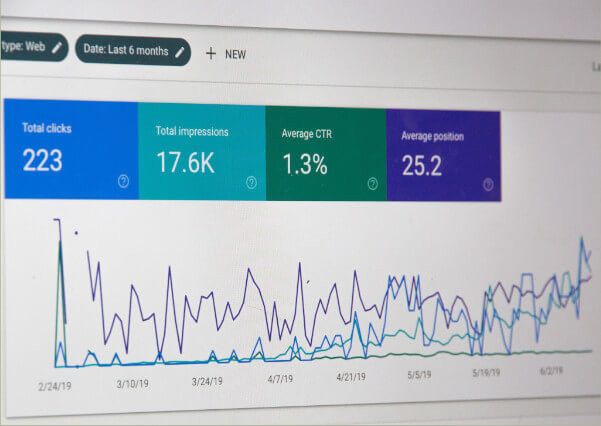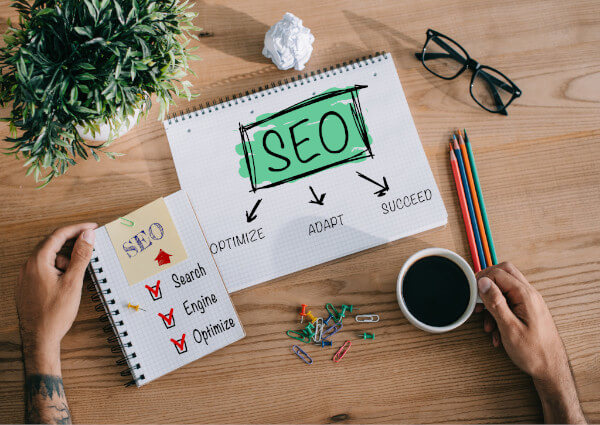
What is SEO? An explanation for beginners
The pandemic made it necessary for many businesses to focus on their online presence. But even way before that, we saw a steady rise in everything moving online. So, perhaps, you want to get on board and have decided to quickly set up a website for your business. Or, you’ve decided to revive your existing website. Great! Now what? One of the ways to get (and keep) people on your website is with SEO. Chances are you’ve already encountered this term somewhere. But what does it actually entail? In this post, we’ll explain what SEO is and how you can get started!
What is SEO?
SEO stands for ‘Search Engine Optimization’. It’s the practice of optimizing your web pages to make them reach a high position in the search results of Google and other search engines. This means that people will be more likely to encounter your website when searching online. SEO focuses on improving the rankings in the organic – aka non-paid – search results. If you have a website and you want to get more traffic, there’s no doubt about it: SEO should be part of your marketing efforts.

Google’s search result page for the term ‘neptune planet’
In the image above, we see the first few results when someone searches for the keyphrase ‘Neptune planet’. In this case, Wikipedia is the first result and this means that their page on Neptune ranks #1 on this search term. The idea behind SEO is that when you optimize your page to become the best result, you can climb those rankings and become one of the first results that people see. Which will get you more clicks and traffic to your site!
Although this example only shows us organic results, this isn’t always the case. Depending on the search term someone uses, there can also be some ads at the top, or a rich result, or a few products by Google Shopping. There are a lot of different possibilities, and what Google shows can also depend on what it knows about the searcher (the country they live in, for example).
Google’s algorithm
How high each result ranks is determined by Google’s algorithm. And although parts of Google’s algorithm remain secret, years of experience in SEO have given us insight into the most important ranking factors. These ranking factors can be divided into two categories:
On-page SEO factors
The ranking of your pages is partly determined by on-page factors. On-page SEO factors are all the things on your website that you have a direct influence on. These factors include technical aspects (e.g. the quality of your code and site speed) and content-related aspects, like the structure of your website or the quality of the copy on your website. These are all crucial on-page SEO factors that you can work on.
Off-page SEO factors
In addition to on-page SEO factors, your rankings are also determined by a few off-page SEO factors. These factors include links from other websites, social media attention, and other marketing activities that happen off of your own website. Although not impossible, these off-page SEO factors can be more difficult to influence. The most important of these off-page factors is the number and quality of links pointing towards your site. The more quality, relevant sites that link to your website, the higher your position in Google will be.
Another off-page factor that plays a role in SEO is your competition relating to the niche of your particular business. In some niches, it is much harder to rank than in others. The competitiveness of your market therefore also has a major influence on your chances of ranking.
Holistic SEO
At Yoast, we practice ‘holistic SEO‘. With holistic SEO, your primary goal is to build and maintain the best possible website. You don’t try to fool Google but invest your time and effort in a sustainable long-term strategy. Working on improving your pages and having a high-quality website will improve your chances of ranking. Because Google wants to offer its users the best results to their search query and the best results are the ones that have great content, but are also user-friendly, fast, and easily accessible.
Ranking well in search engines like Google asks for an extensive SEO strategy focused on every aspect of your website and its marketing. The technical side, the user experience (UX), the content on your website: all need to be top-notch. To keep ranking well in Google, you should develop – what we call – a holistic SEO approach.
How can we help you get started?
At Yoast, our mission is to make SEO accessible for everyone. That’s why we have a few plugins that can help you with that, like our popular Yoast SEO plugin. We have a free and premium version of this plugin. One of the main advantages is that it helps you create high-ranking content. Our free SEO and readability analysis gives you detailed suggestions to create copy humans and search engines enjoy!
The premium version of our plugin will help you get to that next level and optimize your content for synonyms and related keywords and boost your site structure with our internal linking suggestions. You’ll also get access to all of our SEO courses, where you can learn vital SEO skills that you will be able to apply immediately!
Go Premium and get access to all our features!
Premium comes with lots of features and free access to our SEO courses!
Get Yoast SEO Premium Only 89 GBP(ex VAT) for 1 site
Conclusion
SEO is the practice of optimizing websites to make them reach a high position in Google’s – or another search engine’s – search results. At Yoast, we believe that holistic SEO is the best way to rank your pages because you focus on optimizing every aspect of your site.
Don’t use any black-hat SEO tricks, because eventually, this will have negative consequences for your rankings. Instead, practice sustainable SEO, with your user in mind, and you will benefit in the long run. Read more on how to rank high in Google or if you use WordPress, make sure to check out our ultimate guide on SEO in WordPress:
Read more: The ultimate guide to WordPress SEO »
The post What is SEO? An explanation for beginners appeared first on Yoast.
Did you miss our previous article…
https://searchenginesemseo.com/?p=419





